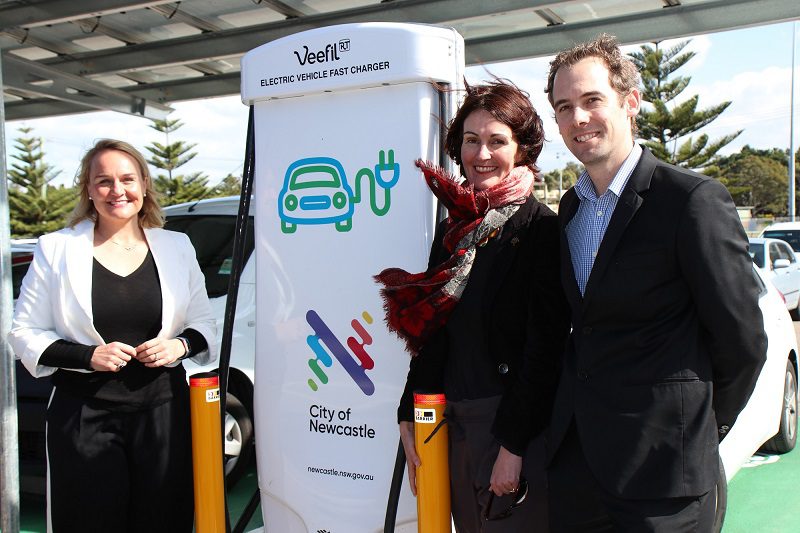The City of Newcastle is getting ready for the transition to electric mobility, with a solar car park and electric vehicle charging stations completed at a recreational sports hub.
One 50kW Veefil-RT electric vehicle charger made by Brisbane-based Tritium and two 22kW Level 2 AC “destination” chargers will be powered by 44kW of solar panels covering the car park, which will also store energy in 120kWh of batteries at the site, enough to power the average Newcastle home for nine days.
As a rule of thumb, the 22kW chargers can add up to 40km of range – the average daily commute for most Australians – in 20 minutes (depending on the vehicle model’s maximum AC charging rate), while the 50kW charger can add up to 40km of driving range in just 10 minutes (see our article here for more on charging rates).
Forming a test bed for similar projects being considered by the City of Newcastle, the “E-Transit Hub” at the No. 2 Sportsground which is home of the Newcastle Wanderers Rugby Club, the solar car park will also supply 100% renewable energy to the facility
Newcastle mayor Nuatali Nelmes said that electric vehicle ownership was on the rise in Newcastle, and the installation of the EV charging stations demonstrated Newcastle’s acceptance of zero emissions vehicles.
“Installing this E-Transit hub is an important part of demonstrating to our community that Newcastle is an electric vehicle-friendly city where you can be confident the infrastructure is in place to support the vehicles’ growing popularity,” Nelmes said in a statement.
“Number 2 Sportsground is the first location in a planned roll-out of future EV charging stations across the city, as we progressively see a move away from the dependence on fossil-fuel powered transport to cleaner and more sustainable modes such as electric vehicles and bikes.
“Through our own Smart City Strategy, and with the help of the Federal Government’s $5 million Smart Cities and Suburbs Program grant, Number 2 Sportsground is now a completely self-sustaining site capable not only of charging electric vehicles but also powering the sportsground lights and other facilities.”
Local electric vehicle owner Michael Barwell said he was thrilled to see Newcastle install charging infrastructure for those wanting to make the switch to electric vehicles.
“The adoption rate of electric vehicles in Newcastle is definitely on the rise and we are only going to see more people transfer from traditional fossil-fuel engines to electric powered in the years to come,” he said.
“It is fantastic that the City of Newcastle is supporting the future of electric vehicles which not only helps our residents but also visitors to our beautiful city.”
The City of Newcastle is also planning three more EV charging sites, to be installed by early 2020 as part of a $13 million Smart Moves Newcastle project, $5 million of which was funded through the federal government’s 2017 Smart Cities and Suburbs program.
The three other sites are planned for Newcastle’s central business district at Queen Street car park, Laman Street and on Wharf Road.
All electric vehicle charging stations will be free for EV drivers for an introductory period.
Newcastle is not the only regional NSW council embracing the shift to electric vehicles – Byron Shire Council is also in the process of installing a $380,000, 99kW solar roof on the council carpark next to the library in Mullumbimby, including an EV charging site that will be available for use by members of the public.

Bridie Schmidt is associate editor for The Driven, sister site of Renew Economy. She has been writing about electric vehicles since 2018, and has a keen interest in the role that zero-emissions transport has to play in sustainability. She has participated in podcasts such as Download This Show with Marc Fennell and Shirtloads of Science with Karl Kruszelnicki and is co-organiser of the Northern Rivers Electric Vehicle Forum. Bridie also owns a Tesla Model Y and has it available for hire on evee.com.au.

